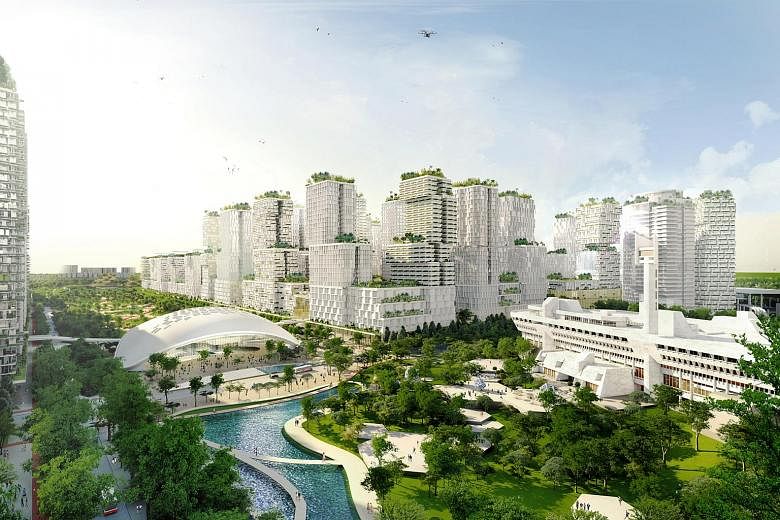SINGAPORE - The axing of the Kuala Lumpur-Singapore High Speed Rail (HSR) will have no immediate bearing on development plans for the Jurong region, which was slated to host the project's southernmost terminus, experts said on Friday (Jan 1).
Jurong's status as the economic and social centre in the west predated the HSR and will survive it, said Singapore University of Social Sciences' associate professor of economics Walter Theseira.
He said: "I believe our plans to continue developing the Jurong region remain unchanged; they were not contingent on the HSR being built."
Observers also noted that the "least bad" outcome had been achieved: A deal off the table, but communicated through a joint statement that committed to strengthening bilateral cooperation and connectivity between Singapore and Malaysia.
The statement, released on Friday morning, noted that Malaysia had proposed several changes to the project, prompting discussions that failed to reach consensus. Malaysia then allowed the HSR agreement to lapse, said Singapore's Transport Ministry separately.
The 350km line would have run from a terminal station in Bandar Malaysia, in downtown Kuala Lumpur, to a terminal in Singapore's western Jurong area.
Then National Development Minister Lawrence Wong also said in 2018 after Malaysia made its first suggestion to scrap the project that work to transform Jurong had started in 2008, before both countries agreed to build the HSR in 2013, and that the decision on the terminus' location was made only in 2015.
The surrounding Jurong Lake District was positioned, in 2017, as Singapore's future second central business district (CBD) - with an ambitious, 20-year blueprint for commercial, housing, nature and transport developments, along with the potential for creating some 100,000 new jobs.
Two years later, the Government announced that the district would include a new 7ha integrated tourism development from 2026.
Flexibility was worked into plans for the district, to cater for changing circumstances such as this, said assistant professor Raymond Ong of the National University of Singapore (NUS), who researches transport infrastructure. "So the land that was acquired for the HSR could easily be reconfigured or redeployed to align with the long-term vision of the region."
On the property front, Dr Lee Nai Jia, deputy director of NUS' Institute of Real Estate and Urban Studies, said buyers and sellers alike would have steeled themselves after two years of delays and talk of cancelling the HSR altogether.
Prior to work on the project being suspended in 2018, it was anticipated that the HSR would deliver higher property prices and surging commercial and retail activity in the area. In 2016, condominiums in the vicinity saw strong demand at launches.
"In the short term, any impact on price is unlikely. Nobody will lower their price at this point," he said. "In the long term, the concept of a 'second CBD' might be harder to achieve without the HSR. It's not impossible, but it'll take a long time to build up that kind of economies of scale resembling a CBD. That might limit the scope of price appreciation."
Prof Theseira added that Singapore could wait and see how Malaysia progresses with reported plans to continue with a domestic, "downgraded" version of the HSR connecting KL to Johor Baru.
"(If) there is a realistic prospect that the system could be extended to Singapore and provide the same quality of service between Singapore and KL as originally planned... then we could always hold the land in reserve, or lease it out on a short-term basis," he said. "(Otherwise) we should just proceed with longer term redevelopment with the land."
Singapore-Malaysia remain 'interconnected'
Mr Harrison Cheng, associate director of consultancy Control Risks, said the silver lining was that the JB-Singapore Rapid Transit System (RTS) Link rail shuttle service remains on track.
The first civil contract for its construction was awarded in November 2020, with the second due in the first quarter of 2021. The RTS Link should be operational by end-2026.
"There is much stronger consensus in Putrajaya, Johor and Singapore to implement this in time… HSR by comparison was far more contentious a proposition since Najib fell," said Mr Cheng. Former Malaysian prime minister Najib Razak presided over the signing of the HSR agreement with Singapore in 2016.
Member of Parliament Saktiandi Supaat, who chairs the Government Parliamentary Committee for Transport, still looks forward to future connectivity initiatives between the two countries. "The economic and agglomeration effects are huge between cities in Malaysia and Singapore," he said.
Mr Cheng added that the aborted project was unlikely to change the tenor of bilateral relations between the Causeway neighbours.
"There isn't any marked anti-Singapore sentiment in (current Malaysian PM) Muhyiddin Yassin's administration, unlike with his predecessor Mahathir Mohamad," said Mr Cheng.
"The only change is that Singapore is going to be warier of getting into bilateral projects, given not just the economic conditions caused by Covid-19, but importantly, the political risk over the border… Changes in government in Malaysia tend to trigger contract risks."
Prof Theseira said that even though the termination of the HSR was a loss for both sides, Singapore and Malaysia had managed to resolve the matter - and disputes, if any - with mutual respect.
"It is in neither side's interest to have an acrimonious termination of the deal, because the broader bilateral relationship is at stake and global investors are watching this very closely," he said.
The former nominated MP added: "We should take heart from the fact that even during the Covid-19 pandemic, we have maintained the flow of goods across the Causeway and some limited flow of people. That is no small feat considering how many countries, even within the famously integrated European Union, have closed borders at some point.
"Covid-19 has also concentrated the minds of both countries on how interconnected our economies and people are."


